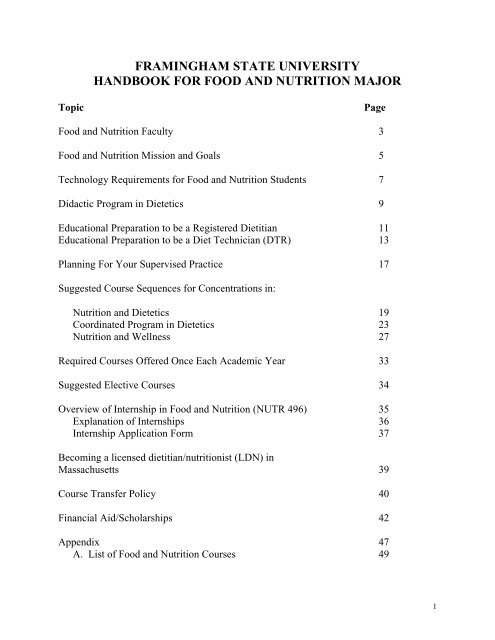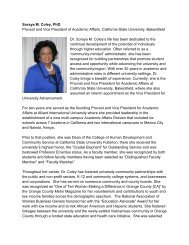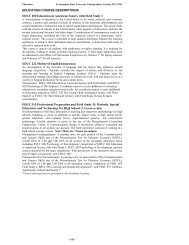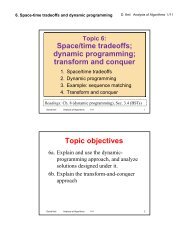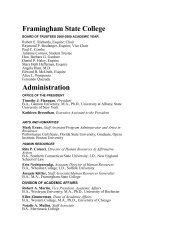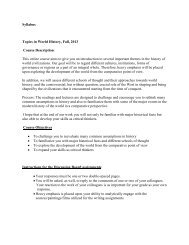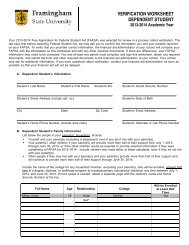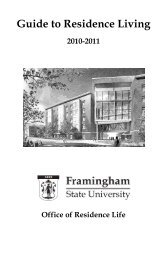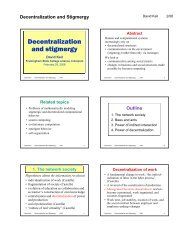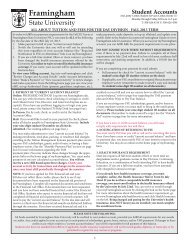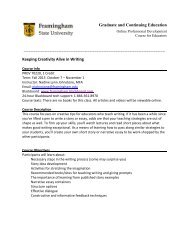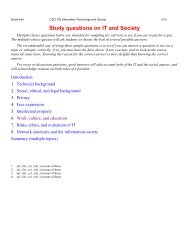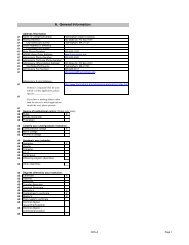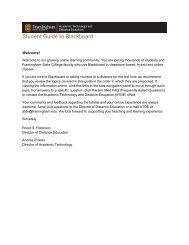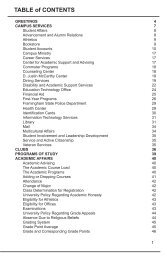Food and Nutrition Student Handbook - Framingham State University
Food and Nutrition Student Handbook - Framingham State University
Food and Nutrition Student Handbook - Framingham State University
Create successful ePaper yourself
Turn your PDF publications into a flip-book with our unique Google optimized e-Paper software.
FRAMINGHAM STATE UNIVERSITY<br />
HANDBOOK FOR FOOD AND NUTRITION MAJOR<br />
Topic Page<br />
<strong>Food</strong> <strong>and</strong> <strong>Nutrition</strong> Faculty 3<br />
<strong>Food</strong> <strong>and</strong> <strong>Nutrition</strong> Mission <strong>and</strong> Goals 5<br />
Technology Requirements for <strong>Food</strong> <strong>and</strong> <strong>Nutrition</strong> <strong>Student</strong>s 7<br />
Didactic Program in Dietetics 9<br />
Educational Preparation to be a Registered Dietitian 11<br />
Educational Preparation to be a Diet Technician (DTR) 13<br />
Planning For Your Supervised Practice 17<br />
Suggested Course Sequences for Concentrations in:<br />
<strong>Nutrition</strong> <strong>and</strong> Dietetics 19<br />
Coordinated Program in Dietetics 23<br />
<strong>Nutrition</strong> <strong>and</strong> Wellness 27<br />
Required Courses Offered Once Each Academic Year 33<br />
Suggested Elective Courses 34<br />
Overview of Internship in <strong>Food</strong> <strong>and</strong> <strong>Nutrition</strong> (NUTR 496) 35<br />
Explanation of Internships 36<br />
Internship Application Form 37<br />
Becoming a licensed dietitian/nutritionist (LDN) in<br />
Massachusetts 39<br />
Course Transfer Policy 40<br />
Financial Aid/Scholarships 42<br />
Appendix 47<br />
A. List of <strong>Food</strong> <strong>and</strong> <strong>Nutrition</strong> Courses 49<br />
1
May-12<br />
2
May-12<br />
FOOD AND NUTRITION FACULTY 2011-2012<br />
Department Chair: Professor Janet Schwartz<br />
H 111A (508) 626-4702<br />
jschwartz@framingham.edu<br />
<strong>Food</strong> & <strong>Nutrition</strong> Website: www.framingham.edu/nutrition<br />
Dr. Marilyn Abernethy, RD<br />
Director, Didactic Program in Dietetics<br />
H125 (508) 626-4757<br />
mabernethy@framingham.edu<br />
Dr. Michael Crosier, RD<br />
H107A (508) 626-4753<br />
mcrosier@framingham.edu<br />
Dr. Patricia Luoto, RD, LDN<br />
Director, John Stalker Institute for <strong>Food</strong> <strong>and</strong> <strong>Nutrition</strong><br />
H114 (508) 626-4759<br />
pluoto@framingham.edu<br />
Dr. Ann W. Johnson, RD, LN,MBA<br />
H121 (508) 626-XXXX<br />
ajohnson@framingham.edu<br />
Dr. Susan Massad, RD, LDN<br />
H120 (508) 626-4743<br />
smassad@framingham.edu<br />
Professor Karen McGrail, MEd, RD, LDN<br />
H135C (508) 626-4701<br />
kmmcgrail@framingham.edu<br />
Dr. Suzanne Neubauer, RD, CNSD, LDN<br />
Director, Coordinated Program in Dietetics (CPD)<br />
Faculty Coordinator: <strong>Student</strong>s submit course transfer credit <strong>and</strong> internship<br />
course requests to Dr. Neubauer.<br />
Advisor, Master of Science in <strong>Food</strong> <strong>and</strong> <strong>Nutrition</strong><br />
H116 (508) 626-4754<br />
sneubauer@framingham.edu<br />
Professor Janet Schwartz, RD, LDN<br />
Department Chair<br />
H111A (508) 626-4702<br />
jschwartz@framingham.edu<br />
3
May-12<br />
4
May-12<br />
<strong>Food</strong> <strong>and</strong> <strong>Nutrition</strong><br />
Mission <strong>State</strong>ment<br />
The <strong>Food</strong> <strong>and</strong> <strong>Nutrition</strong> program at <strong>Framingham</strong> <strong>State</strong> <strong>University</strong> will develop a<br />
course of study that enables graduates to actively participate in the changing food<br />
environment, in the nutrition education process, <strong>and</strong> in health care delivery systems<br />
according to the highest st<strong>and</strong>ards of client service <strong>and</strong> professional ethics.<br />
The Coordinated Program in Dietetics concentration integrates an academic <strong>and</strong><br />
supervised practice curriculum to prepare students to be entry-level dietitians. The<br />
<strong>Nutrition</strong> <strong>and</strong> Dietetics concentration (Didactic Program in Dietetics) offers an<br />
academic curriculum to prepare students to be accepted into a dietetic internship to<br />
become a Registered Dietitian or into a graduate program, or to pursue a career in a<br />
food, nutrition or related field. The <strong>Nutrition</strong> <strong>and</strong> Wellness program offers an<br />
academic curriculum to prepare students to pursue a career in a food, nutrition or<br />
related field.<br />
<strong>Food</strong> <strong>and</strong> <strong>Nutrition</strong> Program Goals:<br />
1. The program will prepare graduates to become nutrition professionals.<br />
a. 85 % of junior students will complete the <strong>Food</strong> <strong>and</strong> <strong>Nutrition</strong> major <strong>and</strong> 85 % of<br />
students accepted to the Coordinated Program in Dietetics will finish it.<br />
b. <strong>Student</strong>s will respond 3 or higher on a five-point scale on each course evaluation<br />
when asked if the course meets the specific Foundation Knowledge <strong>and</strong> Skills of the<br />
American Dietetic Association identified for that course.<br />
c. Graduates will respond 3 or higher on a five-point scale when asked to assess their<br />
academic background in subject areas, some of which comprise the Foundation<br />
Knowledge <strong>and</strong> Skills, when surveyed 6 – 12 months after program completion.<br />
d. Employers will respond 3 or higher on a five-point scale on the Employer or<br />
Dietetic Internship Director Questionnaire when asked to rate graduates’<br />
preparation for an entry-level dietetic<br />
position.<br />
2. The program will prepare graduates to become dedicated learners throughout life <strong>and</strong><br />
career.<br />
a. 80 % (of respondents) of the Coordinated Program in Dietetics <strong>and</strong> the <strong>Nutrition</strong> <strong>and</strong><br />
Dietetics concentration students who completed a dietetic internship will have<br />
completed the continuing professional educational requirements of the Commission<br />
on Dietetic Registration <strong>and</strong> remained Registered Dietitians when surveyed five years<br />
after program completion.<br />
5
May-12<br />
b. 50 % (of respondents) of the <strong>Nutrition</strong> <strong>and</strong> Dietetics concentration students who do<br />
not complete a dietetic internship <strong>and</strong> 50 % (of respondents) of the <strong>Nutrition</strong> <strong>and</strong><br />
Wellness concentration students will be employed in the food <strong>and</strong> nutrition field <strong>and</strong><br />
will identify at least one method of continuing professional education when surveyed<br />
five years after program completion.<br />
3. The program will foster a variety of careers in food <strong>and</strong> nutrition.<br />
a. <strong>Student</strong> responses related to job titles on the <strong>Framingham</strong> <strong>State</strong> <strong>University</strong> Career<br />
Center’s survey <strong>and</strong> on the <strong>Food</strong> <strong>and</strong> <strong>Nutrition</strong> concentrations’ graduate surveys<br />
will indicate that graduates are employed in at least three areas of nutrition <strong>and</strong><br />
dietetics when surveyed 6 – 12 months after program completion.<br />
4. The program will enable students to develop technology proficiency.<br />
a. <strong>Student</strong>s will respond 3 or higher on a five-point scale on course evaluations when<br />
asked if specific courses meet the Foundation Knowledge <strong>and</strong> Skills I.<br />
Communications: Demonstrated Ability to use current information technologies.<br />
b. Employers will respond 3 or higher on a five-point scale on the Employer<br />
Questionnaire when asked to rate graduates’ computer skills.<br />
<strong>Food</strong> <strong>and</strong> <strong>Nutrition</strong> Program Goal for the <strong>Nutrition</strong> <strong>and</strong> Dietetics <strong>and</strong> Coordinated Program in<br />
Dietetics Concentrations Only:<br />
5. The program will prepare Coordinated Program in Dietetics <strong>and</strong> <strong>Nutrition</strong> <strong>and</strong> Dietetics<br />
concentration students who have completed a dietetic internship to pass the Registration<br />
Exam administered by the Commission on Dietetic Registration of The American<br />
Dietetic Association.<br />
a. The program graduates over a 5-year period will achieve at least an 85 % pass rate on<br />
the Registration Examination for Dietitians administered by the Commission on<br />
Dietetic Registration.<br />
6
May-12<br />
Technology Requirements for <strong>Food</strong> <strong>and</strong> <strong>Nutrition</strong> <strong>Student</strong>s<br />
As entering freshman <strong>and</strong> transfer students majoring in <strong>Food</strong> <strong>and</strong> <strong>Nutrition</strong>, you are required to<br />
have a wireless laptop computer. Courses in <strong>Food</strong> <strong>and</strong> <strong>Nutrition</strong> will have projects <strong>and</strong> lectures<br />
based on computer programs, Blackboard <strong>and</strong> the Internet. The instructor will inform you of<br />
class sessions which will require you to bring your computer to class. Programs required are<br />
Microsoft Word, Excel, PowerPoint, <strong>and</strong> Publisher, as well as a diet analysis program. <strong>Nutrition</strong><br />
Science <strong>and</strong> Applications (NUTR 205) will require you to purchase Diet Analysis Plus.<br />
<strong>Framingham</strong> <strong>State</strong> <strong>University</strong> & Dell Partner to<br />
Bring You the Dell Laptop<br />
http://www.framingham.edu/information-technology-services/special-offers/laptop-program/<br />
The intent of <strong>Framingham</strong> <strong>State</strong> <strong>University</strong>'s laptop program is to bring technology-<br />
rich tools <strong>and</strong> resources into the classroom <strong>and</strong> help instructors to exp<strong>and</strong> <strong>and</strong><br />
deepen the learning experiences of their students. The wireless technology exp<strong>and</strong>s<br />
the access for students <strong>and</strong> instructors to Web-based <strong>and</strong> network-based resources<br />
through the use of laptops equipped with wireless LAN cards communicating with<br />
Wireless access units.<br />
All new students entering the <strong>University</strong> are required to own a wireless laptop computer. Each<br />
year, the <strong>University</strong> secures a competitive price based on the best value, warranty <strong>and</strong> service for<br />
a recommended laptop for students <strong>and</strong> the <strong>University</strong> to purchase.<br />
7
May-12<br />
8
May-12<br />
<strong>Framingham</strong> <strong>State</strong> <strong>University</strong><br />
Didactic Program in Dietetics<br />
The Didactic Program in Dietetics (DPD) is a term used by the American Dietetic Association<br />
(ADA) to describe the program accredited under the Eligibility Requirements <strong>and</strong> Accreditation<br />
St<strong>and</strong>ards (ERAS) as meeting academic requirements for admission to a supervised practice<br />
program. <strong>Framingham</strong> <strong>State</strong> <strong>University</strong> has one of 228 Didactic Programs; it is accredited by the<br />
Commission on Accreditation for Dietetic Education. Graduates of the <strong>Framingham</strong> <strong>State</strong><br />
<strong>University</strong>, <strong>Food</strong> <strong>and</strong> <strong>Nutrition</strong> major, <strong>Nutrition</strong> <strong>and</strong> Dietetics concentration, meet DPD<br />
requirements. <strong>Student</strong>s in the Coordinated Program in Dietetics (CPD) meet the DPD<br />
requirements <strong>and</strong> the Supervised Practice Requirements <strong>and</strong> are eligible, upon graduation, to take<br />
the Registration Examination for Dietitians.<br />
The Didactic Program in Dietetics meets the Foundation Knowledge Requirements for Didactic<br />
Curriculum content of the American Dietetic Association for the entry-level dietitians. These<br />
Foundation Knowledge Requirements are based on data which has defined dietetic practice at the<br />
national level. Each college or university then develops a plan of courses to meet the Foundation<br />
Knowledge Requirements. DPD course requirements will, therefore, vary somewhat between<br />
institutions.<br />
A student who has an undergraduate degree from another institution may complete DPD<br />
requirements at <strong>Framingham</strong> <strong>State</strong> <strong>University</strong> through the Master of Science in <strong>Food</strong> <strong>and</strong><br />
<strong>Nutrition</strong>, Coordinated Program in Dietetics concentration. Visit<br />
http://www.framingham.edu/graduate-<strong>and</strong>-continuing-education/graduate-programs/coordinated-<br />
program-in-dietetics/index.html for additional information or schedule an appointment with Dr.<br />
Suzanne Neubauer at 508-626-4550.<br />
9
May-12<br />
10
May-12<br />
<strong>Framingham</strong> <strong>State</strong> <strong>University</strong><br />
Educational Preparation to be a Registered Dietitian<br />
Listed below are the minimum requirements set by the American Dietetic Association to become<br />
a Registered Dietitian.<br />
I. A Bachelors degree from a four-year accredited institution.<br />
II. Coursework that meets Didactic Program in Dietetics (DPD).<br />
DPD programs are approved <strong>and</strong> accredited by the Commission on Accreditation for<br />
Dietetics Education <strong>and</strong> must meet the Foundation Knowledge for Didactic Curriculum<br />
content set forth in the Eligibility Requirements <strong>and</strong> Accreditation (ERAS) of the<br />
American Dietetic Association.<br />
A Verification statement confirming completion of the DPD is provided by the<br />
DPD Director after the student has submitted an official <strong>Framingham</strong> <strong>State</strong> <strong>University</strong><br />
transcript. Copies of this form with original signatures are required for application to a<br />
supervised practice program, application for active membership in the American Dietetic<br />
Association <strong>and</strong> application for eligibility to write the registration exam. <strong>Student</strong>s should<br />
request five copies of this form with original signatures at the time they complete DPD<br />
requirements.<br />
III. Supervised Practice Program that meets the Competencies/ Learning<br />
Outcomes for Dietitian Education Supervised Practice (minimum of 1200 hours) in one<br />
of two types of accredited programs:<br />
Coordinated Program – integrates the supervised practice with the academic requirements<br />
at either the undergraduate or graduate level.<br />
OR<br />
Dietetic Internship – post-baccalaureate supervised practice usually administered by a<br />
hospital, medical center, university or college.<br />
IV. Successful completion of the Registration Examination for Dietitians. To apply for<br />
eligibility to take the Registration Examination, applicants must submit Verification<br />
<strong>State</strong>ments from the Supervised Practice Program. The Registration Examination for<br />
Dietitians is given as a computer based exam at testing centers year round. Applicants<br />
submit an eligibility application <strong>and</strong> Verification statement to the Commission on<br />
Accreditation for Dietetics Education.<br />
11
May-12<br />
12
Dietetic Technician Pathway III for DPD Graduates<br />
The Commission on Dietetic Registration established a new registration eligibility pathway for<br />
dietetic technicians in 2009. Individuals who have completed both a baccalaureate degree <strong>and</strong><br />
a Didactic Program in Dietetics (DPD) are able to take the registration examination for dietetic<br />
technicians without meeting additional academic or supervised practice requirements. This<br />
decision is consistent with CDR’s public protection mission in that it provides a credential for<br />
the numerous non-credentialed DPD graduates currently employed in dietetic technician<br />
positions. Once credentialed, these individuals will be required to comply with CDR<br />
recertification requirements, the Code of Ethics for the Profession of Dietetics <strong>and</strong> the<br />
St<strong>and</strong>ards of Practice. CDR also believes that this alternative registration eligibility option<br />
will increase the availability <strong>and</strong> visibility of DTRs throughout the country ultimately<br />
enhancing the value of the DTR credential.<br />
New Pathway III – Definition:<br />
Completion of a Baccalaureate degree granted by a US regionally accredited<br />
college/university, or foreign equivalent, <strong>and</strong> completion of an Accreditation<br />
Council for Education in <strong>Nutrition</strong> <strong>and</strong> Dietetics (ACEND) Didactic Program in<br />
Dietetics (DPD).<br />
For security reasons, all c<strong>and</strong>idates must be processed for eligibility to take the examination by<br />
their DPD Program Director. CDR updated its on-line Credential Registration <strong>and</strong><br />
Maintenance System (CRMS) to accommodate this registration eligibility pathway. DPD<br />
program directors were sent their secure CRMS access codes in 2009, which allows them to<br />
process their BS/DPD graduates for eligibility to take the registration examination for dietetic<br />
technicians.<br />
CRMS processing procedures have recently been updated (April 2011), <strong>and</strong> are available via<br />
CDR’s website (http://www.cdrnet.org/PDFs/DPD%20CRMS%20Application-<br />
April%202011.pdf ), or by calling 800/877-1600 Peggy Anderson at ext. 4764 or Joe LasCola<br />
at ext. 4781.<br />
If you have comments or questions about this eligibility option to take the registration<br />
examination for dietetic technicians, please call Kay Manger-Hague at ext. 4777, or reply<br />
to pdirecto@eatright.org .<br />
May-12<br />
13
Examination C<strong>and</strong>idate Information <strong>and</strong> Study Resources:<br />
Computer Based Testing Fact<br />
Sheet: http://www.cdrnet.org/certifications/rddtr/cbtfaq.cfm<br />
Study Guide for the Registration Examination for Dietetic Technicians, 6th<br />
edition: http://www.cdrnet.org/PDFs/CDRDTOrderForm.pdf<br />
Information About Becoming a Dietetic Technician<br />
Registered http://www.eatright.org/students/getstarted/highschool.aspx<br />
Frequently Asked Questions:<br />
1. Why did CDR establish this new pathway?<br />
A: For the past several years CDR has noted that number of dietetic technicians,<br />
registered has been declining at a rapid rate. This decline, coupled with the uneven<br />
geographic distribution of DTRs, poses a significant challenge for employers who seek to<br />
hire DTRs. CDR strongly supports the role of the dietetic technician <strong>and</strong> believes that this<br />
new pathway will address both of these issues. This decision is consistent with CDR’s<br />
public protection mission in that it provides a credential for the numerous non-credentialed<br />
DPD graduates currently employed in dietetic technician positions. Once credentialed,<br />
these individuals will be required to comply with CDR recertification requirements,<br />
the Code of Ethics for the Profession of Dietetics <strong>and</strong> the St<strong>and</strong>ards of Practice. CDR also<br />
believes that this alternative registration eligibility option will provide a dietetics career<br />
ladder, increase the availability <strong>and</strong> visibility of DTRs throughout the country, ultimately<br />
enhancing the value of the DTR credential.<br />
2. Can an individual who has their DPD Verification <strong>State</strong>ment <strong>and</strong> an original baccalaureate<br />
degree transcript submit their "Registration Eligibility Application for the Registration<br />
Examination for Dietetic Technicians” directly to CDR for processing?<br />
A: No. Programs directors provide the technical review <strong>and</strong> verification of all applicant<br />
documentation <strong>and</strong> submit the approved c<strong>and</strong>idate application to CDR for final processing.<br />
The only exception to this procedure is when the DPD program is no longer open.<br />
3. If the applicant obtained a baccalaureate degree in a foreign country, does the degree have to<br />
be verified as an equivalent to a degree by one of the foreign degree equivalency agencies<br />
specified by CDR?<br />
A: Yes, the degree must be determined equivalent by one of the agencies listed on CDR’s<br />
website at http://www.eatright.org/ACEND/content.aspx?id=5966 or a degree equivalency<br />
office at a U.S. regionally accredited college or university.<br />
4. If an applicant has their international transcript evaluated by an agency not approved by<br />
CDR, does it have to be re-evaluated by one of the approved agencies?<br />
A: Yes. Transcript evaluation agencies are reviewed against specific CDR criteria. If<br />
approved, the agency is added to CDR’s listing of approved transcript evaluation agencies.<br />
May-12<br />
14
May-12<br />
No other agency evaluation will be accepted.<br />
5. Who is now eligible to take the registration examination for dietetic technicians?<br />
A: Individuals who have completed a minimum of a Baccalaureate degree granted by a<br />
U.S. regionally accredited college/university or foreign equivalent <strong>and</strong> a Didactic Program<br />
in Dietetics (DPD) program as verified by a DPD Program Director.<br />
6. Is there a recency of education requirement?<br />
A. No, CDR does not require recency of education. However, individuals that graduated<br />
under a Plan IV curriculum rather than a Didactic Program curriculum will not be eligible<br />
to sit for the DTR examination without first meeting current Didactic Program in Dietetics<br />
(DPD) requirements.<br />
7. Are graduates of a Coordinated Program (CP) in Dietetics or a Dietetic Internship (DI)<br />
Program who have already established eligibility to take the registration examination for<br />
dietitians now eligible to take the registration examination for dietetic technicians?<br />
A: Yes, provided they have completed DPD program requirements through either an<br />
undergraduate program or a Coordinated Program (CP) in Dietetics. These individuals<br />
should contact Elaine Butler at 1-800-877-1600, ext. 4859, to request an examination<br />
application.<br />
8. Will Didactic Programs receive information on the success of their graduates who take the<br />
registration examination for dietetic technicians?<br />
A. CDR will generate 6–month <strong>and</strong> 5-Year Summary Reports on the examination results<br />
of DPD graduates that sit for the DTR examination <strong>and</strong> provide these to the Commission<br />
on Accreditation for Dietetics Education (ACEND) for distribution to assist programs in<br />
the evaluation of the outcomes of their graduates.<br />
Kay Manger-Hague, RD<br />
Director - Credentialing Operations<br />
Commission on Dietetic Registration<br />
the credentialing agency for the<br />
Academy of <strong>Nutrition</strong> <strong>and</strong> Dietetics<br />
(formerly the American Dietetic Association)<br />
15
May-12<br />
16
May-12<br />
<strong>Framingham</strong> <strong>State</strong> <strong>University</strong>:<br />
Planning for your Supervised Practice<br />
<strong>Food</strong> <strong>and</strong> <strong>Nutrition</strong> students should begin planning for their supervised practice early in their<br />
<strong>University</strong> program. <strong>Student</strong>s should be aware that all supervised practice programs<br />
(Coordinated Program <strong>and</strong> Dietetic Internships) are competitive <strong>and</strong> require an application<br />
process that evaluates academic average (overall <strong>and</strong> in professional courses), work <strong>and</strong><br />
academic references, <strong>and</strong> quality of work experience in dietetics.<br />
The Coordinated Program in Dietetics at <strong>Framingham</strong> <strong>State</strong> <strong>University</strong> requires a minimum of a<br />
2.5 overall grade point average (GPA), <strong>and</strong> a 2.0 GPA in science courses. Current applicants<br />
accepted into CPD have a 3.0 overall GPA with a GPA in science courses of 3.0.<br />
How should I prepare for applying to the CPD?<br />
1. Maintain a good academic average. Don’t let any semester “slide.” Utilize the<br />
services of CASA (College Academic Support Services – Peirce Hall Annex) for<br />
tutoring <strong>and</strong> other academic assistance.<br />
2. Plan to get a summer <strong>and</strong>/or weekend job in the dietetics field. The CPD requires<br />
200 hours of experience (NUTR 002 Orientation to Dietetics) before a student can be<br />
accepted into the program.<br />
3. Meet with your advisor frequently. If you are experiencing difficulty in a course, initiate <strong>and</strong><br />
maintain communication with the professor.<br />
4. For admission to the Coordinated Program, you must have completed up to Organic<br />
Chemistry, Human Anatomy & Physiology: Cellular <strong>and</strong> Organ System or Human<br />
Physiology, <strong>and</strong> <strong>Food</strong>, Culture <strong>and</strong> Society (see course sequence) before beginning the<br />
program (you may apply while enrolled in these courses). Applications are accepted in<br />
February for entrance in the 2-year program the following fall. Notification of acceptance is<br />
in April.<br />
<strong>Student</strong>s in the <strong>Food</strong> <strong>and</strong> <strong>Nutrition</strong> Dietetics concentration apply to Dietetic Internships (DI) the<br />
last semester of their coursework. To be competitive, students should have at least a 3.0 or better<br />
overall GPA with a 3.0 GPA in dietetics <strong>and</strong> science courses. Current national acceptance rate<br />
for DIs is approximately 50%. While some supervised practice programs pay a stipend to<br />
interns, most do not. You should plan that the supervised practice year will be without pay <strong>and</strong><br />
may require a substantial clinical fee or tuition payment.<br />
How should I prepare for applying to DI?<br />
1. Maintain a good academic average. Don’t let any semester “slide.” Utilize the services<br />
of CASA (College Academic Support Services – Peirce Hall Annex) for tutoring <strong>and</strong><br />
other academic assistance.<br />
17
2. Plan to get a summer <strong>and</strong>/or weekend job in the dietetics field. Internships look for<br />
relevant work experience in their applicants. <strong>Student</strong>s may want to complete NUTR 002<br />
Orientation to Dietetics (no credit) to indicate on their <strong>University</strong> transcripts that they<br />
have 200 hours of relevant dietetics experience.<br />
3. Meet with your advisor frequently. If you are experiencing difficulty in a course, initiate<br />
<strong>and</strong> maintain communication with the professor. Repeat courses in which the grade is a<br />
C- or lower, to maintain a competitive QPA.<br />
4. Meet with the DPD Director, Dr. Marilyn Abernethy, sophomore/junior year to go over<br />
current GPA, dietetic work experience, <strong>and</strong> <strong>University</strong> activities.<br />
5. The online dietetic internship application is submitted during the last semester of<br />
coursework. You should begin early (sophomore year) to select programs to which you<br />
would like to apply. All programs with descriptive information are listed on the ADA<br />
website at www.eatright.org. There is a CD-Rom that contains more in depth<br />
information on all dietetic internships that can be checked out from Dr. Abernethy<br />
(H125).<br />
6. If possible, a student should attend dietetic internship open houses, especially if they are<br />
in Massachusetts.<br />
7. It is recommended that students consider taking a <strong>Food</strong> <strong>and</strong> <strong>Nutrition</strong><br />
Internship/Independent Study (NUTR 490, 496, or 499). Please see page 32 for additional<br />
information regarding internship options.<br />
May-12<br />
18
Year One: Fall semester<br />
May-12<br />
FOUR YEAR PROGRAM COMPLETION PLAN<br />
Department of _<strong>Food</strong> <strong>and</strong> <strong>Nutrition</strong>_<br />
Recommended Schedule for ________ Major with <strong>Nutrition</strong> <strong>and</strong> Dietetics Concentration<br />
Year One: Spring Semester<br />
NUTR 205 <strong>Nutrition</strong> Science <strong>and</strong> Applications CHEM 108 Principles of Chemistry <strong>and</strong> Quantitative<br />
Analysis (pre, L) (Goal 6)<br />
CHEM 107 Principles of Chemistry (L) (Goal 6) BIOL 101 Biological Concepts (L) (Goal 7)<br />
Goal 1 - Writing Goal 3 - Language<br />
Goal 2 – Quantitative (MATH 123 College Algebra<br />
recommended)<br />
Year Two: Fall Semester<br />
Goal 9 - General Psychology OR Introduction to<br />
Sociology (Goal 9,12) OR Introduction to Cultural<br />
Anthropology (Goal 9,11)<br />
Year Two: Spring Semester<br />
BIOL 272 Human Physiology & Anatomy: Cellular <strong>and</strong> NUTR 262 <strong>Food</strong>, Culture <strong>and</strong> Society (pre, L)<br />
Organ Systems (pre, L) OR BIOL 333 Human<br />
Physiology<br />
CHEM 207 Organic Chemistry I (pre, L) Goal 8 - Historical Studies (Study of the Constitution)<br />
Goal 4 - Literature or Philosophy Elective<br />
Goal 5 - Visual or Performing Arts (COMM 107 Elective<br />
Effective Speaking recommended)<br />
Year Three: Fall Semester<br />
Year Three: Spring Semester<br />
CHEM 301 Biochemistry (pre, L) NUTR 384 <strong>Food</strong>service Systems (pre, L)<br />
NUTR 364 Experimental Study of <strong>Food</strong> (pre, L) BIOL 307 Microbiology (pre, L)<br />
Goal 10 - Forces in the United <strong>State</strong>s Goal 11 Non-Western Studies<br />
NUTR 482 Management of <strong>Food</strong> & <strong>Nutrition</strong> Services Goal 12 - Gender, Class, <strong>and</strong> Race<br />
Year Four: Fall Semester<br />
Year Four: Spring Semester<br />
NUTR 374 Human <strong>Nutrition</strong> Science (pre) NUTR 478 Community <strong>Nutrition</strong> (pre)<br />
NUTR 381 Introduction to <strong>Nutrition</strong> Practice (pre) NUTR 479 Computer Applications in <strong>Nutrition</strong> (pre)<br />
Elective NUTR 483 Medical <strong>Nutrition</strong> Therapy (pre)<br />
Elective Elective<br />
General Education Goals Checklist - <strong>Student</strong>s must fill all of the following (goal _ is fulfilled through the major):<br />
___ Goal 1 Writing ___ Goal 7 Life Science*<br />
___ Goal 2 Quantitative (fulfilled through major) ___ Goal 8 Historical Studies<br />
___ Goal 3 Language ___ Goal 9 Social <strong>and</strong> Behavioral Science<br />
___ Goal 4 Literature or Philosophy ___ Goal 10 Forces in the United <strong>State</strong>s<br />
___ Goal 5 visual or Performing Arts ___ Goal 11 Non-Western Studies<br />
___ Goal 6 Physical Science* ___ Goal 12 Gender, Class, <strong>and</strong> Race<br />
*___ One of these must be a lab course ___ Study of the Constitutions<br />
19
May-12<br />
Explanation of Course Sequence<br />
pre = prerequisite course(s) required, review catalog<br />
L = laboratory included as part of course<br />
General Education Goals - <strong>Student</strong>s who transfer in courses accepted as meeting General Education goals<br />
may elect to take other courses. <strong>Student</strong>s must take at least 12 General Education courses to fulfill the<br />
General Education requirement.<br />
General Education Goals 1 <strong>and</strong> 2 must be taken within the first three semesters; other General Education<br />
courses are interchangeable <strong>and</strong> in some instances, two goals can be met by one course, e.g., overlay. If<br />
course selection meets two goals, then a free General Education elective is possible.<br />
<strong>Student</strong>s should use this course sequence as a guideline for discussion with their advisor.<br />
NOTES:<br />
1. Please be aware of the following course sequencing:<br />
Chemistry <strong>and</strong> Clinical <strong>Nutrition</strong> Course Sequence<br />
Principles of Chemistry Principles of Chemistry <strong>and</strong> Quantitative Analysis<br />
Organic Chemistry I Biochemistry Human <strong>Nutrition</strong> Science Medical <strong>Nutrition</strong><br />
Therapy<br />
Chemistry <strong>and</strong> <strong>Food</strong>service Course Sequence<br />
Principles of Chemistry Principles of Chemistry <strong>and</strong> Quantitative Analysis<br />
Organic Chemistry I Experimental Study of <strong>Food</strong> <strong>Food</strong>service Systems<br />
<strong>Nutrition</strong> Course Sequence<br />
<strong>Nutrition</strong> Science & Applications <strong>Food</strong>, Culture <strong>and</strong> Society Experimental Study<br />
of <strong>Food</strong> <strong>Food</strong>service Systems<br />
<strong>Food</strong>, Culture <strong>and</strong> Society Introduction to <strong>Nutrition</strong> Practice Community <strong>Nutrition</strong><br />
2. See this h<strong>and</strong>book or <strong>University</strong> catalog for other suggested electives.<br />
3. <strong>Student</strong>s may elect to minor in another Department. Recommended minors are <strong>Food</strong><br />
Science, Psychology, Communications, Modern Languages, Business, or Sociology. See<br />
university catalog for specific course requirements.<br />
4. Experience has shown that students who need to work more than 10 hours a week<br />
should consider taking fewer than 4 courses/semester.<br />
20
BIOL 307<br />
Principles of<br />
Microbiology<br />
BIOL 101<br />
Biological Concepts<br />
BIOL 272<br />
Human Anatomy &<br />
Physiology: Cellular <strong>and</strong><br />
Organ Systems<br />
Or BIOL 333<br />
Human Physiology<br />
CHEM 301<br />
Biochemistry I<br />
NUTR 374<br />
Human <strong>Nutrition</strong><br />
Science<br />
CHEM 107<br />
Principles of Chemistry<br />
CHEM 108<br />
Principles of Chemistry<br />
<strong>and</strong> Quantitative<br />
Analysis<br />
CHEM 207<br />
Organic Chemistry I<br />
NUTR 364<br />
Experimental Study of<br />
<strong>Food</strong><br />
NUTR 384<br />
<strong>Food</strong> Service Systems<br />
NUTR 482<br />
Management of <strong>Food</strong><br />
<strong>and</strong> <strong>Nutrition</strong> Systems<br />
NUTR 483<br />
Medical <strong>Nutrition</strong><br />
Therapy<br />
NUTR 205<br />
<strong>Nutrition</strong> Science <strong>and</strong><br />
Applications<br />
NUTR 262<br />
<strong>Food</strong>, Culture, <strong>and</strong><br />
Society<br />
NUTR 381<br />
Introduction to<br />
<strong>Nutrition</strong> Practice<br />
NUTR 478<br />
Community <strong>Nutrition</strong><br />
<strong>Nutrition</strong> & Dietetics<br />
Course Sequence<br />
BIOL 272--Human Anatomy &<br />
Physiology: Cellular <strong>and</strong> Organ<br />
Systems or<br />
BIOL 333--Human Physiology<br />
NUTR 479<br />
Computer Applications in<br />
<strong>Nutrition</strong><br />
21
FOUR YEAR PROGRAM COMPLETION PLAN<br />
Department of _<strong>Food</strong> <strong>and</strong> <strong>Nutrition</strong>_<br />
Recommended Schedule for ________ Major with Coordinated Program in Dietetics Concentration<br />
CPD: Suggested Course Sequence for Entering Freshmen<br />
Freshman Year Fall Freshman Year Spring<br />
<strong>Nutrition</strong> Science <strong>and</strong> Applications<br />
Principles of Chemistry<br />
Goal 1 - Writing<br />
Goal 2 - Quantitative<br />
Principles of Chemistry & Quantitative Analysis (Goal 6)<br />
Biological Concepts (Goal 7)<br />
Goal 3 - Language<br />
Goal 4 - Literature or Philosophy<br />
Sophomore Year Fall Sophomore Year Spring<br />
Human Physiology & Anatomy: Cellular <strong>and</strong> Organ Systems<br />
OR Human Physiology<br />
Organic Chemistry I<br />
Goal 5 - Visual or Performing Arts<br />
Elective course<br />
<strong>Food</strong>, Culture, <strong>and</strong> Society<br />
General Psychology (Goal 9) OR Intro to Sociology (Goal<br />
9,12) OR Cultural Anthropology (Goal 9,11)<br />
Biochemistry<br />
Goal 10 - Forces in the United <strong>State</strong>s (Study of Constitution<br />
overlay if not met by Goal 8)<br />
Orientation to Dietetics (work experience, no credit)<br />
Summer: Microbiology, General Education course Goal 8 - Historical Studies - Study of Constitution with Goal 10 Overlay<br />
OR General Education elective (Goal 9, 11 or 12) 1<br />
Begin Coordinated Program in Dietetics<br />
Junior Year Fall Junior Year Spring<br />
Human <strong>Nutrition</strong> Science<br />
Introduction to <strong>Nutrition</strong> Practice (SP 2 lab)<br />
Experimental Study of <strong>Food</strong><br />
Goal 8 - Historical Studies - Study of Constitution with Goal<br />
10 Overlay OR General Education elective (Goal 9, 11 or 12)<br />
<strong>Food</strong>service Systems (SP 2 lab)<br />
Medical <strong>Nutrition</strong> Therapy (SP 2 lab)<br />
Community <strong>Nutrition</strong><br />
Microbiology or Goal 8 - Historical Studies - Study of<br />
Constitution with Goal 10 Overlay OR General Education<br />
elective(Goal 9, 11 or 12) 3<br />
Summer: Microbiology, General Education course Goal 8 - Historical Studies - Study of Constitution with Goal 10 Overlay<br />
OR General Education elective (Goal 9, 11 or 12) 1<br />
<strong>Nutrition</strong> in the School Environment (0.5 course-credit)(On-Line) 4 (DGCE fee applies.)<br />
Senior Year Fall<br />
NOTE: Course Schedule Does NOT Permit Additional<br />
Courses<br />
Seminar in Clinical <strong>Nutrition</strong><br />
Clinical Experience in Dietetics (SP 2 ) (credit: 2 courses)<br />
Senior Year Spring<br />
NOTE: Course Schedule Does NOT Permit Additional<br />
Courses<br />
Management of <strong>Food</strong> <strong>and</strong> <strong>Nutrition</strong> Services<br />
Practicum in <strong>Food</strong>service Systems (9 weeks SP 2 )<br />
Experience in Community <strong>Nutrition</strong> (7 weeks SP 2 )<br />
School <strong>Nutrition</strong> Practicum (0.5 course-credit) (SP 2 ) 4<br />
1 One course must be taken during summer session following sophomore or junior year to meet graduation requirements. Options for summer session include:<br />
general education goals not previously taken or microbiology. Intersession options for General Education courses are also available in sophomore or junior<br />
year.<br />
2 Supervised Practice<br />
3 Strongly recommended to take over the summer to decrease workload.<br />
4 Required summer on-line course provides an overview of nutrition <strong>and</strong> health education curricula available for implementation in the school nutrition<br />
practicum. Division of Graduate <strong>and</strong> Continuing Education (DGCE) fee applies. The supervised practice is completed during the same semester as<br />
Experience in Community <strong>Nutrition</strong>. <strong>Student</strong>s who affiliate with a school nutrition program for Practicum in <strong>Food</strong>service Systems will be paired with a<br />
student who has an alternate foodservice placement to complete this experience.<br />
23
May-12<br />
General Education Goals Checklist<br />
<strong>Student</strong>s must fill all of the following (goal _ is fulfilled through the major):<br />
___ Goal 1 Writing ___ Goal 7 Life Science*<br />
___ Goal 2 Quantitative (fulfilled through major) ___ Goal 8 Historical Studies<br />
___ Goal 3 Language ___ Goal 9 Social <strong>and</strong> Behavioral Science<br />
___ Goal 4 Literature or Philosophy ___ Goal 10 Forces in the United <strong>State</strong>s<br />
___ Goal 5 visual or Performing Arts ___ Goal 11 Non-Western Studies<br />
___ Goal 6 Physical Science* ___ Goal 12 Gender, Class, <strong>and</strong> Race<br />
*___ One of these must be a lab course ___ Study of the Constitutions<br />
NOTES:<br />
1. Please be aware of the following course sequencing:<br />
Chemistry <strong>and</strong> Clinical <strong>Nutrition</strong> Course Sequence<br />
Principles of Chemistry Principles of Chemistry <strong>and</strong> Quantitative Analysis<br />
Organic Chemistry I Biochemistry Human <strong>Nutrition</strong> Science Medical <strong>Nutrition</strong> Therapy<br />
Chemistry <strong>and</strong> <strong>Nutrition</strong> (<strong>Food</strong>service) Course Sequence<br />
<strong>Nutrition</strong> Science & Applications <strong>Food</strong>, Culture <strong>and</strong> Society Organic Chemistry I<br />
Experimental Study of <strong>Food</strong> <strong>Food</strong>service Systems Management of <strong>Food</strong> <strong>and</strong> <strong>Nutrition</strong><br />
Services<br />
<strong>Nutrition</strong> (Community) Course Sequence<br />
<strong>Food</strong>, Culture <strong>and</strong> Society Introduction to <strong>Nutrition</strong> Practice Community <strong>Nutrition</strong><br />
2. <strong>Student</strong>s may elect to minor in another Department. Other recommended minors are <strong>Food</strong> Science,<br />
Psychology, Communications, Modern Languages, Business, or Sociology. See university catalog for<br />
requirements. Note: A minimum of three courses to satisfy any minor must be taken at <strong>Framingham</strong><br />
<strong>State</strong> <strong>University</strong>.<br />
3. Experience has shown that students who need to work more than 10 hours a week should<br />
consider taking fewer than 4 courses/semester.<br />
24
NUTR 381<br />
Introduction to <strong>Nutrition</strong> Practice<br />
21 hr Practicum: 3 hr/wk x 7 wk<br />
NUTR 205<br />
<strong>Nutrition</strong> Science <strong>and</strong><br />
Applications<br />
NUTR 262<br />
<strong>Food</strong>, Culture, <strong>and</strong><br />
Society<br />
COMMUNITY CLINICAL<br />
NUTRITION<br />
NUTR 478<br />
Community<br />
<strong>Nutrition</strong><br />
NUTR 486<br />
Experience in<br />
Community <strong>Nutrition</strong><br />
7 wk Practicum: 24<br />
hr/wk<br />
<strong>Nutrition</strong> in the<br />
School<br />
Environment<br />
(summer online<br />
workshop)<br />
NUTR 487<br />
School <strong>Nutrition</strong><br />
Practicum<br />
7 wk: 8 hr/wk<br />
BIOL 272/lab<br />
Human Anatomy<br />
& Physiology:<br />
Cellular <strong>and</strong> Organ<br />
Systems<br />
NUTR 374<br />
Human <strong>Nutrition</strong><br />
Science<br />
NUTR 483/lab<br />
Medical <strong>Nutrition</strong> Therapy<br />
20 hr Practicum: 4 hr x 5 wks<br />
On campus lab: 10 wks<br />
NUTR 488<br />
Seminar in Clinical<br />
<strong>Nutrition</strong><br />
NUTR 489<br />
Clinical Experience in<br />
Dietetics (2 course credits)<br />
15 wk Practicum: 24 hr/wk<br />
NUTR 364/lab<br />
Experimental Study of<br />
<strong>Food</strong><br />
CHEM<br />
301/lab<br />
Biochemistry<br />
Coordinated Program in<br />
Dietetics Course Sequence<br />
FOODSERVICE<br />
CHEM 207/lab<br />
Organic Chemistry I<br />
NUTR 482<br />
Management of <strong>Food</strong><br />
<strong>and</strong> <strong>Nutrition</strong> Systems<br />
NUTR 485<br />
Practicum in<br />
<strong>Food</strong>service Systems<br />
9 wk: 24 hr/wk<br />
25
<strong>Nutrition</strong> <strong>and</strong> Wellness Concentration<br />
This concentration is for students who do not plan to pursue requirements for the Registration Exam<br />
for Dietitians. <strong>Student</strong>s take basic science courses in chemistry <strong>and</strong> biology in addition to a core of<br />
food <strong>and</strong> nutrition courses that provide a general background in nutrition <strong>and</strong> health, community<br />
nutrition, <strong>and</strong> foodservice management. <strong>Student</strong>s complete a one-course internship during their<br />
senior year.<br />
A minor in one of the following areas is strongly recommended for this concentration: Biology,<br />
Business, Information technology, Journalism (work with the FSU Gatepost), Psychology,<br />
Sociology, Spanish, Communication arts, or Professional writing. <strong>Student</strong>s should work closely<br />
with their advisors in choosing courses for their minors that will enhance their professional<br />
background.<br />
27
Year One: Fall semester<br />
May-12<br />
FOUR YEAR PROGRAM COMPLETION PLAN<br />
Department of _<strong>Food</strong> <strong>and</strong> <strong>Nutrition</strong>_<br />
Recommended Schedule for ________ Major with <strong>Nutrition</strong> <strong>and</strong> Wellness Concentration<br />
Year One: Spring Semester<br />
NUTR 205 <strong>Nutrition</strong> Science <strong>and</strong> Applications PSYC 101 General Psychology (Goal 9)<br />
CHEM 103 General Chemistry OR CHEM 107<br />
Principles of Chemistry (L) (Goal 6)<br />
BIOL 142 Introduction to Human Biology (Goal 7)<br />
Goal 1 - Writing Goal 3 Language<br />
Goal 2 - Quantitative CONS 210 Consumer Economics<br />
Year Two: Fall Semester<br />
Year Two: Spring Semester<br />
NUTR 262 <strong>Food</strong>, Culture <strong>and</strong> Society (pre, L) Goal 8 - Historical Studies (Study of the Constitution)<br />
ENGL 286 Professional Writing CHEM 201 Organic Chemistry (L)<br />
Goal 4 - Literature or Philosophy NUTR 271 <strong>Nutrition</strong> for Sports <strong>and</strong> Exercise<br />
CONS 105 Personal & Community Health Goal 5 - Visual or Performing Arts (Suggest COMM<br />
107 Effective Speaking)<br />
Year Three: Fall Semester<br />
Year Three: Spring Semester<br />
NUTR 364 Experimental Study of <strong>Food</strong> (p, L) Elective<br />
NUTR 381 Introduction to <strong>Nutrition</strong> Practice (pre) Elective (Suggest: PSYC 205 Health Psychology)<br />
NUTR 482 Management of <strong>Food</strong> & <strong>Nutrition</strong> Services Goal 11 Non-Western Studies<br />
Elective<br />
A minor is strongly recommended.<br />
CONS 310 Drug Addiction<br />
Year Four: Fall Semester<br />
Year Four: Spring Semester<br />
NUTR 384 <strong>Food</strong>service Systems (p) NUTR 496 Internship in <strong>Food</strong> <strong>and</strong> <strong>Nutrition</strong><br />
NUTR 478 Community <strong>Nutrition</strong> (pre) NUTR 479 Computer Applications in <strong>Nutrition</strong> (pre)<br />
Goal 12 - Gender, Class, <strong>and</strong> Race Goal 10 – Forces in the United <strong>State</strong>s (Study of the<br />
Constitution if not met by Goal 8)<br />
NUTR 390 Special Topics in <strong>Nutrition</strong> Elective<br />
General Education Goals Checklist - <strong>Student</strong>s must fill all of the following (goal _ is fulfilled through the major):<br />
___ Goal 1 Writing ___ Goal 7 Life Science*<br />
___ Goal 2 Quantitative (fulfilled through major) ___ Goal 8 Historical Studies<br />
___ Goal 3 Language ___ Goal 9 Social <strong>and</strong> Behavioral Science<br />
___ Goal 4 Literature or Philosophy ___ Goal 10 Forces in the United <strong>State</strong>s<br />
___ Goal 5 visual or Performing Arts ___ Goal 11 Non-Western Studies<br />
___ Goal 6 Physical Science* ___ Goal 12 Gender, Class, <strong>and</strong> Race<br />
*___ One of these must be a lab course ___ Study of the Constitutions<br />
28
May-12<br />
Explanation of Course Sequence<br />
pre = prerequisite course(s) required, review catalog<br />
L = laboratory included as part of course.<br />
General Education Goals - <strong>Student</strong>s who transfer in courses accepted as meeting General Education goals may elect<br />
to take other courses. <strong>Student</strong>s must take at least 12 General Education courses to fulfill the General Education<br />
requirement.<br />
General Education Goals 1 <strong>and</strong> 2 must be taken within the first three semesters; other General Education courses<br />
are interchangeable <strong>and</strong> in some instances, two goals can be met by one course, e.g., overlay. If course selection<br />
meets two goals, then a free General Education elective is possible.<br />
<strong>Student</strong>s should use this course sequence as a guideline for discussion with their advisor.<br />
NOTES:<br />
1. Please be aware of the following course sequencing:<br />
Chemistry <strong>and</strong> <strong>Nutrition</strong> Course Sequence<br />
General Chemistry Organic Chemistry Experimental Study of <strong>Food</strong><br />
<strong>Nutrition</strong> Course Sequences<br />
A. <strong>Nutrition</strong>: Science <strong>and</strong> Applications <strong>Food</strong>, Culture <strong>and</strong> Society Experimental Study of<br />
<strong>Food</strong> <strong>Food</strong>service Systems Management of <strong>Food</strong> <strong>and</strong> <strong>Nutrition</strong> Services<br />
B. <strong>Food</strong>, Culture <strong>and</strong> Society Introduction to <strong>Nutrition</strong> Practice Community <strong>Nutrition</strong><br />
C. <strong>Food</strong> Culture <strong>and</strong> Society Computer Applications in <strong>Nutrition</strong><br />
2. See this h<strong>and</strong>book <strong>and</strong> the university catalog for other suggested electives.<br />
3. <strong>Student</strong>s are encouraged to select a minor in one of the following areas: Biology, Business,<br />
Information technology, Journalism (work with the FSU Gatepost), Psychology, Sociology,<br />
Spanish, Communication arts, or Professional writing.<br />
4. Experience has shown that students who need to work more than 10 hours a week should<br />
consider taking fewer than 4 courses/semester.<br />
29
CHEM 103<br />
General Chemistry<br />
or<br />
CHEM 107<br />
Coordinated Principles of Chemistry Prog<br />
May-12<br />
CHEM 201<br />
Organic Chemistry<br />
NUTR 364<br />
Experimental Study of<br />
<strong>Food</strong><br />
NUTR 384<br />
<strong>Food</strong> Service Systems<br />
NUTR 482<br />
Management of <strong>Food</strong><br />
<strong>and</strong> <strong>Nutrition</strong> Systems<br />
BIOL 142<br />
Intro to Human Biology<br />
or<br />
BIOL 272<br />
Human Anatomy &<br />
Physiology: Cellular <strong>and</strong><br />
Organ Systems<br />
or<br />
BIOL 333<br />
Human Physiology<br />
CONS 310<br />
Drug Addiction<br />
NUTR 205<br />
<strong>Nutrition</strong> Science <strong>and</strong><br />
Applications<br />
NUTR 262<br />
<strong>Food</strong>, Culture, <strong>and</strong><br />
Society<br />
NUTR 381<br />
Introduction to<br />
<strong>Nutrition</strong> Practice<br />
NUTR 478<br />
Community <strong>Nutrition</strong><br />
NUTR 271<br />
<strong>Nutrition</strong> for Sports <strong>and</strong><br />
Exercise<br />
NUTR 479<br />
Computer Applications in<br />
<strong>Nutrition</strong><br />
<strong>Nutrition</strong> <strong>and</strong><br />
Wellness Course<br />
Sequence<br />
NUTR 496<br />
Internship in <strong>Food</strong> <strong>and</strong> <strong>Nutrition</strong><br />
(senior st<strong>and</strong>ing <strong>and</strong> department<br />
permission required)<br />
30
May-12<br />
31
May-12<br />
32
May-12<br />
Required Courses Offered Only Once Each Academic Year<br />
Course Number/Name Semester Offered<br />
BIOL 272 Human Anatomy <strong>and</strong> Physiology I Fall (Alternate)<br />
BIOL 307 Principles of Microbiology Spring <strong>and</strong> Summer<br />
BIOL 333 Principles of Human Physiology Fall (Alternate)<br />
CHEM 107 Principles of Chemistry** Fall<br />
CHEM 108 Principles of Chemistry <strong>and</strong> Quantitative Analysis** Spring<br />
CHEM 201 Organic Chemistry Spring<br />
CHEM 207 Organic Chemistry I Fall<br />
CHEM 478 Community <strong>Nutrition</strong>* Spring<br />
NUTR 479 Computer Applications in <strong>Nutrition</strong> Spring<br />
NUTR 483 Medical <strong>Nutrition</strong> Therapy Spring<br />
NUTR 374 Human <strong>Nutrition</strong> Science* Fall<br />
NUTR 381 Introduction to <strong>Nutrition</strong> Practice* Fall<br />
*These courses are taught both semesters every other year. Please check with your advisor for<br />
the schedule.<br />
** These courses have been offered since 2010 during summer semester.<br />
Important Note: There may be other scheduling changes in course offerings;<br />
check with your advisor for updates in course offerings<br />
33
May-12<br />
Suggested Electives for <strong>Food</strong> <strong>and</strong> <strong>Nutrition</strong> Majors<br />
Some of these courses may be required courses for one of the three (3) <strong>Food</strong> <strong>and</strong> <strong>Nutrition</strong><br />
Concentrations, please check your concentration requirements <strong>and</strong> the course prerequisites<br />
before selecting courses from this list.<br />
ACCT 220 Introduction to Financial Accounting<br />
COMM 105 Foundations of Communication<br />
COMM 107 Effective Speaking<br />
COMM 115 Introduction to Speech Communication<br />
CONS 105 Personal & Community Health<br />
CONS 210 Consumer Economics<br />
CONS 314 Consumer <strong>and</strong> Health Communication<br />
CONS 422 Family Financial Decision Making<br />
FDSC 151 Principles of <strong>Food</strong> Science<br />
FDSC 405 <strong>Food</strong> Analysis<br />
ENGL 225 Introduction to Journalism<br />
ENGL 286 Professional Writing<br />
FDSC 151 Principles of <strong>Food</strong> Science<br />
MATH 208 Biostatistics<br />
NUTR 002 Orientation to Dietetics (No course credit)<br />
NUTR 271 <strong>Nutrition</strong> for Sports <strong>and</strong> Exercise<br />
NUTR 390 Special Topics in <strong>Nutrition</strong><br />
NUTR 490 Independent Study in <strong>Food</strong> <strong>and</strong> <strong>Nutrition</strong><br />
NUTR 496 <strong>Food</strong> <strong>and</strong> <strong>Nutrition</strong> Internship<br />
NUTR 499 <strong>Food</strong> <strong>and</strong> <strong>Nutrition</strong> Internship: US Army Natick Research, Development <strong>and</strong><br />
Engineering Center (NRDEC)<br />
PSYC 208 Health Psychology<br />
PSYC 258 Human Relations<br />
PSYC 271 Principles of Behavior Modification<br />
PSYC 286 Psychology of Women<br />
SOCI 101 Introduction to Sociology<br />
SOCI 245 Race <strong>and</strong> Ethnic Relations<br />
SOCI 280 Social Gerontology<br />
SOCI 325 Medical Sociology<br />
34
May-12<br />
Overview of Internship in <strong>Food</strong> <strong>and</strong> <strong>Nutrition</strong> (NUTR 496)<br />
(You are required to follow these guidelines)<br />
*Please review the application on the following three pages to obtain a better<br />
underst<strong>and</strong>ing of the internship process.<br />
You must have a 2.5 QPA in courses in the major. If you do not have a 2.5 QPA, speak to your<br />
advisor.<br />
If you are a <strong>Food</strong> <strong>and</strong> <strong>Nutrition</strong> major with a concentration in <strong>Nutrition</strong> <strong>and</strong> Wellness (FNU), you<br />
may apply for your required internship when you have junior or senior class st<strong>and</strong>ing. NUTR<br />
314 Consumer <strong>and</strong> Health Communication must be completed prior to starting your internship.<br />
If you are a Dietetics or Coordinated Program concentration student you must have junior or<br />
senior st<strong>and</strong>ing.<br />
You must submit your application form found in this h<strong>and</strong>book or on the <strong>Food</strong> <strong>and</strong> <strong>Nutrition</strong><br />
Program website, to your advisor by the end of fall advising period for spring semester internship<br />
<strong>and</strong> end of spring advising period for the fall semester internship.<br />
The application process is very important. You need to meet with your faculty advisor, who will<br />
verify that your QPA is acceptable. You need to prepare a high quality resume to be submitted<br />
with your internship application. Resume assistance can be obtained at the Office of Career<br />
Services. Your resume must be reviewed <strong>and</strong> approved (initialed or signed off) by Career<br />
Services prior to applying to the internship.<br />
You are encouraged to explore various types of internship possibilities. You are free to look for<br />
internship options on your own. The university supervisor will notify you when you need to set<br />
up a formal interview with possible internship sites. Bring a copy of your resume <strong>and</strong> the<br />
internship objectives with you to the interview.<br />
After the interview, discuss the results with the university faculty supervisor. A decision will be<br />
made as to the final placement. Submit drafts of your thank you letters or e-mails to the<br />
interviewer. Once the draft is accepted by your supervisor, send out the letters. A copy of each<br />
thank you letter is placed in your internship file.<br />
All placements are to be finalized before the end of the prior semester. The supervisor will<br />
notify you when the internship will start.<br />
Your grade for the internship is influenced by how responsible <strong>and</strong> competent you were in<br />
setting up your internship.<br />
During the semester all interns are required to attend weekly meetings on campus.<br />
35
May-12<br />
NUTR 490 Independent Study in <strong>Food</strong> <strong>and</strong> <strong>Nutrition</strong><br />
NUTR 496 Internship in <strong>Food</strong> <strong>and</strong> <strong>Nutrition</strong><br />
NUTR 499 Internship in <strong>Food</strong> <strong>and</strong> <strong>Nutrition</strong>: U.S. Army Labs<br />
To apply for these courses, you must complete the application form on the next page or<br />
on the <strong>Food</strong> <strong>and</strong> <strong>Nutrition</strong> Program website (http://www.framingham.edu/food-<strong>and</strong>nutrition/current-student-information/index.html).<br />
The completed application, along with<br />
your goals <strong>and</strong> objectives for the course, must be submitted to your advisor by the end of<br />
fall advising period for internships starting in spring semester <strong>and</strong> spring semester at the<br />
end of advising period for internships starting in fall semester. Please include a copy of<br />
your academic course progress form from:<br />
https://my.campus.framingham.edu/cp/home/displaylogin<br />
The course progress form shows the courses you have taken, your grades, <strong>and</strong> your QPA.<br />
NUTR 490 Independent Study in <strong>Food</strong> <strong>and</strong> <strong>Nutrition</strong><br />
An in-depth investigation of a specific topic relating to the student’s area of interest in food <strong>and</strong><br />
nutrition. A written proposal on the topic selected is made by the student to the faculty advisor.<br />
An oral presentation <strong>and</strong> final written report of the student’s topic is required. Prerequisite:<br />
NUTR 374 Human <strong>Nutrition</strong> Science. Application due by October 15 for spring semester <strong>and</strong><br />
February 15 for fall semester.<br />
NUTR 496 Internship in <strong>Food</strong> <strong>and</strong> <strong>Nutrition</strong><br />
A supervised work experience in community nutrition, foodservice management, or medical<br />
nutrition therapy. <strong>Student</strong>s submit an application that identifies specific goals for the experience<br />
<strong>and</strong> a résumé. An ability to work independently is expected. A major project is required. A<br />
minimum of one eight-hour day per week is required. Prerequisites: Senior st<strong>and</strong>ing <strong>and</strong><br />
permission of department chair. A QPA of 2.50 in all courses for the major.<br />
NUTR 499 Internship in <strong>Food</strong> <strong>and</strong> <strong>Nutrition</strong>: U.S. Army Labs<br />
A supervised work experience in food or nutrition as it pertains to the military. The student joins<br />
a research team in one of two areas: U.S. Army Research Institute of Environmental Medicine<br />
(USARIEM), or U.S. Army Sustainability Directorate (SusD). One eight-hour day per week<br />
required. Prerequisites: NUTR 364 Experimental Study of <strong>Food</strong>, NUTR 381 Introduction to<br />
<strong>Nutrition</strong> Practice, <strong>and</strong> QPA of 2.50 in all courses for the major. Departmental permission<br />
required.<br />
36
May-12<br />
<strong>Food</strong> <strong>and</strong> <strong>Nutrition</strong> Internship/Independent Study Application Form<br />
Directions: Please complete the following application form <strong>and</strong> submit it to your faculty adviser. Due<br />
dates are: Fall semester is during spring advising period <strong>and</strong> Spring semester is during fall advising.<br />
Resume: You must submit a professional resume with the internship application. Visit the Career<br />
Services website for help with your resume: http://www.framingham.edu/career-services/students-<strong>and</strong>alumni/resume-<strong>and</strong>-cover-letters.html<br />
. Schedule an appointment with Career Services to review your<br />
resume BEFORE you submit it; you must include documentation that Career Services has reviewed your<br />
resume. Once your internship application is approved, you should send an electronic copy of your resume<br />
to the course instructor.<br />
1. <strong>Student</strong> name Date _______________<br />
2. Current address<br />
Email address _______________________________________________Phone__________________<br />
3. Transportation is the student responsibility. Where will you be living during your internship?<br />
_______________________________________________________________<br />
4. Faculty adviser ________________________<br />
5. Please check your concentration in the food <strong>and</strong> nutrition major:<br />
___ FNU (<strong>Nutrition</strong> <strong>and</strong> Wellness) ___ FND (<strong>Nutrition</strong> <strong>and</strong> Dietetics) ___ FNP (Coordinated<br />
Program)<br />
6. Semester internship requested: Fall 20____ Spring 20____<br />
7. Expected graduation date, please complete: May 20____ August 20____ December 20____<br />
8. Current Overall QPA ___________________<br />
Write the grade you received for each of the following food <strong>and</strong> nutrition courses. If you have not<br />
completed the course, write N/A. If you are currently enrolled in a course, write ‘IP’ to indicate ‘inprogress.’<br />
_____ <strong>Nutrition</strong> Science <strong>and</strong> Applications<br />
_____ <strong>Food</strong>, Culture, <strong>and</strong> Society<br />
_____ Experimental Study of <strong>Food</strong><br />
_____ <strong>Nutrition</strong> for Sports <strong>and</strong> Exercise<br />
_____ Special Topics in <strong>Nutrition</strong>: Chronic Disease<br />
_____ Human <strong>Nutrition</strong> Science<br />
_____ Introduction to <strong>Nutrition</strong> Practice<br />
_____ <strong>Food</strong>service Systems<br />
_____ Management of <strong>Food</strong> <strong>and</strong> <strong>Nutrition</strong> Services<br />
_____ Medical <strong>Nutrition</strong> Therapy<br />
_____ Computer Applications in <strong>Nutrition</strong><br />
_____ Community <strong>Nutrition</strong><br />
_____ Consumer <strong>and</strong> Health Communications<br />
37
9. Check the type of internship which you are requesting. Please review course descriptions in the<br />
catalog at http://www.framingham.edu/undergraduate-catalogs/2010-2011/departments-<strong>and</strong>courses.html<br />
___ NUTR 496 Internship in <strong>Food</strong> <strong>and</strong> <strong>Nutrition</strong><br />
___ NUTR 499 <strong>Food</strong> <strong>and</strong> <strong>Nutrition</strong> Internship: U.S. Army Natick Research,<br />
Development <strong>and</strong> Engineering Center (Skip to #11 on the application)<br />
___ NUTR 490 Independent Study in <strong>Food</strong> <strong>and</strong> <strong>Nutrition</strong><br />
10. Are you able to communicate in a language other than English?<br />
May-12<br />
____ Yes ____ No If yes, which language? ____________________________________<br />
11. Rate the population groups with which you would most like to work <strong>and</strong> the settings in which you<br />
would like to work. Indicate your first, second, <strong>and</strong> third choices for both population groups <strong>and</strong><br />
settings by placing 1, 2, or 3 in each column.<br />
Population Setting<br />
__ General population __ Hospital or HMO outpatient service<br />
__ Adults __ Hospital inpatient services<br />
__ Children __ Elderly <strong>Nutrition</strong> Program<br />
__ Pregnant or lactating women __ Business or industry foodservice<br />
__ Infants <strong>and</strong> young children __ School nutrition service<br />
__ Adolescents __ WIC<br />
__ Geriatric population __ Extended care facility<br />
__ Rehabilitation program __ Child care agency<br />
__ Newspaper or other media __ Neighborhood health center<br />
__ Other, please specify________________ __ <strong>Food</strong> company<br />
__ Other, please specify __________________<br />
12. Place an X next to the skills you would like to develop or improve.<br />
__ Patient counseling __ Clinical nutrition<br />
__ <strong>Nutrition</strong> education __ Speaking to groups<br />
__ Staff or professional training __ Management skills<br />
__ Educational program development __ <strong>Food</strong>service operation<br />
__ Technology skills __ <strong>Food</strong> testing<br />
__ Writing __ <strong>Food</strong> science research<br />
__ Other, please specify:__________________________<br />
13. List your major strengths:<br />
1.<br />
2.<br />
3.<br />
14. Please provide any additional information which might be helpful in placing you.<br />
38
May-12<br />
Becoming a Licensed Dietitian/<strong>Nutrition</strong>ist (LDN) in Massachusetts<br />
Once graduates of either the <strong>Nutrition</strong> <strong>and</strong> Dietetics (FND) or the Coordinated Program in<br />
Dietetics (FNP) concentration pass the American Dietetic Association registration examination<br />
<strong>and</strong> become Registered Dietitians (R.D.), they can become a licensed dietitian/nutritionist (LDN)<br />
in Massachusetts. For additional information, go to the Board of Registration of Dietitians <strong>and</strong><br />
<strong>Nutrition</strong>ists: http://www.mass.gov/dpl/boards/nu/cmr/26802.htm.<br />
39
I. Documentation<br />
May-12<br />
<strong>Framingham</strong> <strong>State</strong> <strong>University</strong><br />
Department of Consumer Sciences<br />
<strong>Food</strong> <strong>and</strong> <strong>Nutrition</strong> Major<br />
Course Transfer Credit Policy<br />
You should write a letter to the Committee <strong>and</strong> list the course(s) for which you are<br />
requesting transfer credit <strong>and</strong> the corresponding FSU courses(s). For each course under<br />
consideration, you should provide.<br />
1. a transcript from the college/university where the course was taken.<br />
2. the FSU course progress form printed from www.myframingham.com .<br />
3. a catalog with course descriptions from the college/university where the course was<br />
taken.<br />
4. the textbook name <strong>and</strong> author (provide the text if possible).<br />
5. the course syllabus/outline <strong>and</strong> topic outline.<br />
6. complete Course Substitution Form with your advisor.<br />
The above documentation should be submitted to the student’s advisor who will submit it<br />
to the Course Transfer Credit Committee.<br />
II. Criteria for Granting Transfer Credit<br />
The Committee will determine course transfer credit on the basis of the following criteria:<br />
1. similar course content<br />
2. the level at which the course is taught: the transfer course must have similar<br />
prerequisites to the FSU course<br />
3. if the FSU course has a clinical experience, the transfer course must have an<br />
equivalent clinical experience to receive credit<br />
4. any course accepted for credit which meets The American Dietetic Association's<br />
Foundation Knowledge for Didactic Curriculum Content must have been taken<br />
within 10 years of applying for transfer credit<br />
III. Questionable Transfer Credit<br />
1. At the discretion of the committee, you may be given the opportunity<br />
to test out of a course by passing an exam with an 80 or above. The FSU course<br />
instructor would specify the exam.<br />
2. The committee may ask to see class notes if necessary to determine course<br />
content.<br />
IV. Reporting<br />
1. A memo from the committee, with a copy to the advisor <strong>and</strong> Admissions Office or<br />
40
May-12<br />
Registrar (if appropriate), will be sent to the student.<br />
V. <strong>Student</strong> Questions<br />
1. <strong>Student</strong>s may discuss questions/concerns with the chairperson of the Course<br />
Transfer Credit Committee.<br />
2. <strong>Student</strong>s who wish to appeal a decision of the Course Transfer Credit Committee may<br />
do so in writing to the Chair of the Consumer Sciences Department<br />
41
May-12<br />
Scholarships Available to <strong>Food</strong> <strong>and</strong> <strong>Nutrition</strong> Majors<br />
Information regarding scholarships is available in the Financial Aid Office <strong>and</strong> the website<br />
www.framingham.edu/nutrition. Watch the Department’s bulletin board for notice of<br />
additional scholarships.<br />
FRAMINGHAM STATE UNIVERSITY <strong>and</strong> FOUNDATION SCHOLARSHIPS<br />
FSU Scholarships <strong>and</strong> Foundation Scholarships are awarded based upon academic success <strong>and</strong><br />
sometimes financial need (determined from the FAFSA). They are awarded to both new <strong>and</strong> returning<br />
students.<br />
Freshmen <strong>and</strong> transfer students will be evaluated for scholarships based upon their admissions<br />
application, including official transcripts.<br />
Scholarship Information<br />
In an effort to maximize the awarding of merit <strong>and</strong> need-based scholarships to our students, the College<br />
is adopting new scholarship procedures. Awards will no longer require a scholarship application either for<br />
a first or renewal award. Instead, the College will identify all students who are eligible for the various<br />
scholarships <strong>and</strong> will make awards according to merit, need, or a combination of both considerations.<br />
Scholarship descriptions are listed below.<br />
Please note:<br />
1. You must have a current FAFSA on file to be considered for or to be renewed for any scholarship<br />
with a need-based component. If you do not have a FAFSA on file - you should consider<br />
completing one as soon as possible.<br />
2. If your scholarship has a merit component, such as a minimum QPA, you must remain eligible<br />
under the scholarship's criteria in order to be renewed for that scholarship.<br />
The Class of 1993 Leadership Scholarship was established to help benefit student leaders on campus.<br />
This scholarship is available to a full-time undergraduate junior or senior. The eligible c<strong>and</strong>idate will be a<br />
class officer or executive board member for the class <strong>and</strong> will have served for a minimum of two years.<br />
<strong>Student</strong>s must have a minimum QPA of 2.0 <strong>and</strong> show proven leadership ability as well as outst<strong>and</strong>ing<br />
service to the FSU community. C<strong>and</strong>idates must submit an essay (no more than 300 words) stating why<br />
they chose to become a class officer or serve on the executive board <strong>and</strong> how they have used this role to<br />
serve the FSU community. Two letters of recommendation must be submitted with the application.<br />
Letters should be from individuals who can address the c<strong>and</strong>idate’s leadership skills <strong>and</strong> service.<br />
The Dr. Arthur M. Doyle Scholarship- Dr. Doyle was one of the early advocates for the use of<br />
computers in the classroom. He was committed to making <strong>Framingham</strong> <strong>State</strong> <strong>University</strong> a leader in<br />
academic technology. Dr. Doyle served the College for 34 years, beginning as an assistant professor of<br />
physics <strong>and</strong> rising to the position of full professor <strong>and</strong> chair of the department before moving to academic<br />
administration. He became Academic Vice President in 1999 <strong>and</strong> served in that role until his untimely<br />
death in 2002. The award is open to full time students with junior or senior st<strong>and</strong>ing <strong>and</strong> a minimum<br />
CQPA of 3.0. C<strong>and</strong>idates must submit an essay explaining how the laptop computer experience has<br />
enhanced their academic program of studies.<br />
42
The Lucy Marcille Gillis Scholarship was established in honor of Lucy Marcille Gillis, class of 1919, by<br />
her nieces. The scholarship is to be awarded to a female student who demonstrates financial need <strong>and</strong><br />
has a CQPA of 3.0 or better.<br />
The Dr. Alice M. Glover Scholarship Awards are available to full-time <strong>Framingham</strong> <strong>State</strong> <strong>University</strong><br />
undergraduate science majors “who have demonstrated interest <strong>and</strong> proficiency in the natural sciences.”<br />
A number of these scholarships will be awarded to current students, incoming freshmen <strong>and</strong> transfer<br />
students. Scholarships are renewable annually, provided a minimum QPA of 3.0 is maintained.<br />
The Louise Guild <strong>Nutrition</strong> <strong>and</strong> Biochemistry Scholarship is for students pursing undergraduate or<br />
graduate degrees in <strong>Nutrition</strong> <strong>and</strong>/or Biochemistry, students who are <strong>Nutrition</strong> majors (including Dietetics)<br />
preferably those who are double majoring or minoring in Biochemistry or Biochemistry majors with a<br />
minor in <strong>Nutrition</strong>. <strong>Student</strong>s interested in pursuing research would receive additional consideration.<br />
The Sidney <strong>and</strong> Katherine Goodstein Scholarship is awarded to the student selected as the most<br />
deserving <strong>and</strong> qualified junior or senior in the <strong>Food</strong> & <strong>Nutrition</strong> Department.<br />
The Carmela Hilbert Immigrant Scholarship was established by Carmela Hilbert (class of 1946) in<br />
honor of her mother, Adelina Acchione Cellucci. It is available to financially deserving sophomores,<br />
juniors <strong>and</strong> seniors who are immigrants to the United <strong>State</strong>s of America <strong>and</strong> who have achieved a QPA of<br />
3.0 or higher. Applicants must submit an essay describing what they hope to contribute to society upon<br />
completion of their education at <strong>Framingham</strong> <strong>State</strong> <strong>University</strong>.<br />
The Dr. Constance B. Jordan Scholarship - Dr. Jordan, Professor Emeritus, <strong>and</strong> a member of the<br />
Class of 1941, has served the College in many capacities, including faculty member in <strong>Food</strong> <strong>and</strong><br />
<strong>Nutrition</strong>, Chairperson of the Home Economics Department, Graduate Dean <strong>and</strong> Trustee of the College.<br />
The scholarship is open to applicants who are full-time students with junior or senior st<strong>and</strong>ing, <strong>and</strong> have a<br />
minimum CQPA of 3.0.<br />
The Margaret Fenwick Hinchcliffe Scholarship is awarded to students in the senior class who have<br />
achieved superior academic st<strong>and</strong>ing along with significant involvement in extra-curricular activities on<br />
campus or in one’s home community.<br />
The Robert J. Lemieux Metro West Scholarship was established to assist academically promising <strong>and</strong><br />
financially deserving high school graduates of the Metro West area. The scholarship is open to residents<br />
of the following Metro West towns: Ashl<strong>and</strong>, <strong>Framingham</strong>, Holliston, Hopkinton, Natick, Sherborn,<br />
Southborough, Sudbury, Wayl<strong>and</strong>, <strong>and</strong> Westborough. Priority in funding will be given to previous<br />
recipients who have achieved a grade point average of ‘B’ or better in undergraduate course work.<br />
Applicants must submit a short essay stating what obstacles they have had to overcome in order to<br />
attend the <strong>University</strong>. Recipients must maintain full-time status at the <strong>University</strong>. Applicants must submit<br />
the Free Application for Federal <strong>Student</strong> Financial Aid (FAFSA).<br />
The Susan B. Lyman Scholarship was established as part of a bequest to <strong>Framingham</strong> <strong>State</strong> <strong>University</strong><br />
in 1897 by Susan B. Lyman. It is awarded to a deserving, diligent <strong>and</strong> meritorious junior or senior<br />
demonstrating financial need <strong>and</strong> a minimum QPA or 3.0. Applicants must submit the Free Application for<br />
Federal <strong>Student</strong> Financial Aid (FAFSA).<br />
The Joan Kelleher Martinuzzi Scholarship is made possible through the generosity of Joan Kelleher<br />
Martinuzzi, Class of 1949 <strong>and</strong> her seven children. Upon graduation from <strong>Framingham</strong> <strong>State</strong> <strong>University</strong>,<br />
Mrs. Martinuzzi completed a dietetic internship at the <strong>University</strong> of Michigan <strong>and</strong> then embarked on a<br />
career as a therapeutic dietician before starting a family. The scholarship is intended to assist a deserving<br />
<strong>and</strong> motivated degree-seeking student who plans to enter the dietetics profession or a related field. This<br />
May-12<br />
43
scholarship is awarded to a junior majoring in <strong>Food</strong> <strong>and</strong> <strong>Nutrition</strong> who meets the above criteria <strong>and</strong> has a<br />
cumulative QPA of 3.3 or higher.<br />
The Christa Corrigan McAuliffe Scholarships are available to students who present exemplary<br />
academic credentials combined with evidence of noteworthy achievement in non-academic areas. All<br />
prospective freshmen <strong>and</strong>/or transfer day division students are eligible. Current undergraduate students<br />
at FSU enrolled full time for at least one semester <strong>and</strong> carrying a minimum of three course credits are<br />
eligible for this scholarship. <strong>Student</strong>s must present evidence of a demonstrated talent in one of the<br />
following: art, music, drama, creative writing, journalism, school or community leadership, specific<br />
academic discipline or other suitable area <strong>and</strong> evidence of at least one of the following:<br />
May-12<br />
A. Combined SAT scores of at least 1100.<br />
B. Weighted high school rank in the top 15 percent.<br />
C. Substantial evidence of exceptional academic achievement.<br />
D. A QPA of 3.3 or higher on a 4.0 point scale.<br />
Christa McAuliffe said, “I touch the future, I teach.” In an essay of not more than 700 words, write a<br />
description of a teacher, at any level, who has had a major influence in your life.<br />
The Louisa A. Nicholass Scholarship is named for the former head of the Household Arts Department.<br />
Prior to coming to <strong>Framingham</strong> she served as principal of the Mary Hemenway School of Home<br />
Economics in Boston. Due to her efforts <strong>and</strong> the efforts of others, The American Home Economics<br />
Association in Washington, D.C. was established in 1908. This scholarship is given to students majoring<br />
in Family <strong>and</strong> Consumer Sciences with a minimum QPA of 3.0.<br />
The Doris Butler Sutton Scholarship. Doris Sutton attended the <strong>Framingham</strong> <strong>State</strong> Normal School as<br />
a member of the class of 1921. She lived most of her life in Washington, D.C., <strong>and</strong> died in 1964. This<br />
scholarship is available to undergraduate Family <strong>and</strong> Consumer Science majors. <strong>Student</strong>s must have<br />
completed eight or more courses in order to qualify. Financial need is also a consideration for this<br />
scholarship. Applicants must submit the Free Application for Federal <strong>Student</strong> Financial Aid (FAFSA).<br />
The Jose B. Tombs Scholarship is available to an undergraduate student enrolled at <strong>Framingham</strong> <strong>State</strong><br />
<strong>University</strong>. Applications will be accepted from students who have completed at least one semester (four<br />
courses) at the <strong>University</strong>, <strong>and</strong> have declared their major in a basic or applied science. Preference will be<br />
given to students who have demonstrated proficiency in science courses at <strong>Framingham</strong> <strong>State</strong> <strong>University</strong><br />
<strong>and</strong> have financial need as determined by the Financial Aid Office. Applicants must submit the Free<br />
Application for Federal <strong>Student</strong> Financial Aid (FAFSA).<br />
The War <strong>and</strong> Peace Class of 1945 Scholarship was established on the occasion of its 60th anniversary<br />
of graduation. The scholarship shall be awarded on an alternating basis to an undergraduate student<br />
majoring in teacher education <strong>and</strong>/or subject matter with the intent of becoming a fully licensed teacher;<br />
<strong>and</strong> a student majoring in <strong>Food</strong> <strong>and</strong> <strong>Nutrition</strong> to meet the basic education requirements of the American<br />
Dietetic Association toward full credentialing as a registered dietician (R.D.). Recipients must be a fulltime<br />
junior or senior in the appropriate program, have financial need as determined by the College's<br />
Financial Aid Office, a minimum CQPA of 3.0 <strong>and</strong> Massachusetts residency preferred. Individuals may<br />
only receive this scholarship one time. For the 2009-2010 academic year, the scholarship will be awarded<br />
to an education major.<br />
Marion L. Cronan Memorial Award will be granted to an undergraduate or graduate student with at least<br />
one full semester left to complete their program at <strong>Framingham</strong> <strong>State</strong> <strong>University</strong>, who has demonstrated<br />
ability <strong>and</strong> a passion for the field of nutrition.<br />
44
Off Campus Scholarships:<br />
1. Massachusetts Dietetic Association (MDA) <strong>and</strong> the American Dietetic Association Foundation<br />
(ADAF) scholarships are also posted on the Department’s bulletin board. Both of these<br />
scholarships require the student to be a student member of the ADA.<br />
Visit ADA website: www.eatright.org/<br />
Visit MDA website: www.massnutrition.org/<br />
2. Metrowest Community Health Care Foundation Health Professions Scholarship Program<br />
May-12<br />
Criteria for eligibility:<br />
1. applicants must be a resident or work at least 15 hours per week in one of<br />
the following twenty-five towns: Ashl<strong>and</strong>, Bellingham, Dover,<br />
<strong>Framingham</strong>, Franklin, Holliston, Hopedale, Hopkinton, Hudson,<br />
Marlborough, Medfield, Medway, Mendon, Milford, Millis, Natick,<br />
Needham, Norfolk, Northborough, Sherborn, Southborough, Sudbury,<br />
Wayl<strong>and</strong>, Wellesley, or Westborough.<br />
2. applicants must be enrolled in a nursing, or formal medical, or clinical<br />
training program at accredited institution.<br />
Visit website: www.mchcf.org<br />
3. National Poultry & <strong>Food</strong> Distributors Association Scholarship Foundation (NPFDA) is<br />
pleased to award scholarships to various students of agricultural colleges <strong>and</strong> universities across<br />
the US. Each student selected will receive a $1,500.00 -$2000.00 scholarship from NPFDA.<br />
To qualify, each applicant must:<br />
Be a college junior or senior the upcoming (award) year at a U.S. institution<br />
Be enrolled as a full time student<br />
Be pursuing a Poultry or related Agricultural, Ag Business degree – Agricultural<br />
Business, Poultry Science, <strong>Food</strong> science, Animal Science, Pre Vet, <strong>Food</strong><br />
Marketing, Ag. Econ., etc.<br />
(Unrelated degrees such as English or Nursing will not be considered).<br />
Provide his or her current official transcript - sealed<br />
Provide a letter of recommendation from his or her Dean, Department Head <strong>and</strong>/or<br />
advisor<br />
Complete the enclosed application<br />
Provide a one-page letter describing his or her goals <strong>and</strong> aspirations<br />
All applications <strong>and</strong> documents must be received by the NPFDA office<br />
no later than May 31.<br />
NPFDA SCHOLARSHIP FOUNDATION, INC.<br />
2014 Osborne Rd<br />
Saint Marys, GA 31558<br />
Visit website: http://www.npfda.org/<br />
45
May-12<br />
46
May-12<br />
Appendix A<br />
47
May-12<br />
48
<strong>Food</strong> <strong>and</strong> <strong>Nutrition</strong> Courses:<br />
NUTR 002 Orientation to Dietetics (No course credit)<br />
A non-credit (200 hour minimum work experience in dietetics approved by a <strong>Food</strong> <strong>and</strong> <strong>Nutrition</strong> faculty member. A<br />
written evaluation of the student’s performance is required from the student’s employer. This work experience is<br />
recommended for all <strong>Food</strong> <strong>and</strong> <strong>Nutrition</strong> majors <strong>and</strong> is required prior to admission to the Coordinated Program in<br />
Dietetics.<br />
CONS 105 Personal <strong>and</strong> Community Health<br />
Designed to include discussion <strong>and</strong> debates on health issues that affect us throughout the life cycle. The course<br />
integrates physical, mental, social, emotional, intellectual, <strong>and</strong> spiritual health. Emphasis is placed on health<br />
promotion <strong>and</strong> disease prevention <strong>and</strong> includes examination <strong>and</strong> assessment of community health services.<br />
NUTR 205 <strong>Nutrition</strong> Science <strong>and</strong> Applications (Gen. Ed. Goal 7)<br />
An integration of nutrition science with its application to diet <strong>and</strong> health. Emphasis is placed on nutrient <strong>and</strong> energy<br />
requirements for individuals throughout the life span. Topics include macro- <strong>and</strong> micronutrients; digestion,<br />
absorption, <strong>and</strong> metabolism; body composition <strong>and</strong> weight management; vegetarianism; sports nutrition; chronic<br />
disease; <strong>and</strong> environmental issues. <strong>Student</strong>s conduct a computer analysis of their own diets.<br />
Note: <strong>Student</strong>s cannot receive credit for both NUTR 205 <strong>Nutrition</strong> Science <strong>and</strong> Applications <strong>and</strong> 34.120 Current<br />
Issues in <strong>Nutrition</strong> <strong>and</strong> Health or 34.171 Human <strong>Nutrition</strong> in the Life Cycle.<br />
NUTR 262 <strong>Food</strong>, Culture, <strong>and</strong> Society<br />
A study of the sociocultural <strong>and</strong> economic factors that affect the ways individuals <strong>and</strong> groups manage food. The<br />
impacts of culture, income, gender, age, health concerns, <strong>and</strong> time management are examined. The food system is<br />
studied as it relates to consumers’ needs. <strong>Food</strong> management skills are emphasized in laboratory experiences.<br />
<strong>Nutrition</strong>al analyses are performed on the computer.<br />
Prerequisite: NUTR 205 <strong>Nutrition</strong> Science <strong>and</strong> Applications; <strong>Food</strong> <strong>and</strong> <strong>Nutrition</strong> majors only<br />
NUTR 271 <strong>Nutrition</strong> for Sports <strong>and</strong> Exercise<br />
The study of the association between nutrition <strong>and</strong> exercise performance. Metabolism of carbohydrates, fats,<br />
proteins, vitamins, minerals <strong>and</strong> water <strong>and</strong> its effect on athletic training is stressed. <strong>Nutrition</strong> assessment of athletes,<br />
how to measure body composition, <strong>and</strong> the use of <strong>and</strong> controversy over ergogenic aids are explored in depth.<br />
Prerequisites: NUTR 205 <strong>Nutrition</strong> Science <strong>and</strong> Applications, CHEM 103 General Chemistry or CHEM 107<br />
Principles of Chemistry, BIOL 142 Introduction to Human Biology or BIOL 333 Principles of Human Physiology or<br />
BIOL 272 Human Anatomy <strong>and</strong> Physiology: Cellular <strong>and</strong> Organ Systems.<br />
NUTR 290 Study Tour: <strong>Food</strong> <strong>and</strong> <strong>Nutrition</strong><br />
A food <strong>and</strong> nutrition course taught through on-site exposure to food systems <strong>and</strong>/or culinary practices. Traditional<br />
methods of teaching are also employed. <strong>Student</strong>s gain direct experience of food <strong>and</strong> nutrition in geographic, cultural,<br />
political, educational, culinary <strong>and</strong> historical contexts. <strong>Student</strong>s meet <strong>and</strong> prepare course materials prior to the tour.<br />
The topics <strong>and</strong> locations may vary from year to year <strong>and</strong> are announced in the course schedule. This course, in a<br />
different topic/location, may be repeated for credit. Additional course fees may apply.<br />
CONS 310 Drug Addiction<br />
A multidisciplinary study of the relationships of drug use, misuse, <strong>and</strong> abuse to biological <strong>and</strong> psychological health.<br />
<strong>Student</strong>s explore the types of compounds that can influence brain activity, behavior <strong>and</strong> physiology. Topics include<br />
the history of drug abuse in American society, the nature of tolerance <strong>and</strong> dependence, drug regulation <strong>and</strong> the law,<br />
the categories of drugs (stimulants, depressants, hallucinogens, marijuana <strong>and</strong> hashish, anabolic steroids, inhalants,<br />
narcotics/opiates) <strong>and</strong> their effects on the body systems. This course is appropriate for health educators who cover<br />
drug abuse in educational settings.<br />
Prerequisite: An introductory biology course with lab or permission of the instructor<br />
May-12<br />
49
NUTR 364 Experimental Study of <strong>Food</strong><br />
A study of the scientific basis for the selection, preparation <strong>and</strong> h<strong>and</strong>ling of food. Laboratory application includes<br />
principles underlying food preparation, experimentation in comparative food preparation, <strong>and</strong> an independent<br />
student laboratory research project.<br />
Prerequisite: NUTR 262 <strong>Food</strong>, Culture, <strong>and</strong> Society <strong>and</strong> an organic chemistry course.<br />
NUTR 374 Human <strong>Nutrition</strong> Science<br />
A study of the interrelationships <strong>and</strong> respective functions of nutrients, <strong>and</strong> the integration of nutrition, biochemistry,<br />
<strong>and</strong> human physiology. Emphasis is placed on research design in classic <strong>and</strong> current nutrition studies with respect to<br />
nutrition <strong>and</strong> health.<br />
Prerequisites: CHEM 301 Biochemistry I; <strong>and</strong> BIOL 272 Human Anatomy <strong>and</strong> Physiology: Cellular <strong>and</strong> Organ<br />
Systems or BIOL 333 Principles of Human Physiology.<br />
NUTR 381 Introduction to <strong>Nutrition</strong> Practice<br />
An introduction to the application of nutrition care of individuals <strong>and</strong> groups in a variety of health care settings.<br />
Topics include nutrition assessment <strong>and</strong> care plans, medical terminology <strong>and</strong> documentation, interviewing <strong>and</strong><br />
counseling skills, <strong>and</strong> educational theory <strong>and</strong> material development. The Coordinated Program in Dietetics requires<br />
students to complete a concurrent clinical experience in cooperating health care facilities. <strong>Food</strong> <strong>and</strong> <strong>Nutrition</strong> majors<br />
with a minimum 2.50 QPA may elect to complete a clinical experience. A physical exam <strong>and</strong> liability insurance are<br />
required for clinical experience.<br />
Prerequisites: BIOL 142 Introduction to Human Biology or BIOL 333 Principles of Human Physiology or BIOL 272<br />
Human Anatomy & Physiology: Cellular & Organ Systems; NUTR 262 <strong>Food</strong>, Culture, <strong>and</strong> Society.<br />
NUTR 384 <strong>Food</strong>service Systems<br />
A study of current trends <strong>and</strong> practices in the management of foodservice systems. Using a problem-based learning<br />
approach, the course includes the concepts of food safety, menu planning, procurement, quantity food production,<br />
delivery systems, <strong>and</strong> financial management. Topics are augmented by a laboratory experience in a foodservice<br />
facility. Liability insurance is required.<br />
Prerequisite: NUTR 364 Experimental Study of <strong>Food</strong> or permission of instructor.<br />
NUTR 390 Special Topics in <strong>Nutrition</strong><br />
An exploration into an identified topic in the nutrition field. Topics vary with instructor <strong>and</strong> reflect current trends or<br />
major themes in food <strong>and</strong> nutrition. <strong>Student</strong>s write <strong>and</strong> present a major paper on the topic. Prerequisites: NUTR 262<br />
<strong>Food</strong>, Culture, <strong>and</strong> Society (may be taken concurrently) <strong>and</strong> junior st<strong>and</strong>ing. Additional prerequisites may be<br />
required dependent upon topic.<br />
NUTR 440 Geriatric <strong>Nutrition</strong><br />
An overview of the physiological <strong>and</strong> socioeconomic aspects of aging <strong>and</strong> their impact on nutrition. Course includes<br />
an in-depth discussion of nutritional assessment, nutrition programs, <strong>and</strong> chronic medical disorders associated with<br />
the older adult.<br />
Prerequisite: NUTR 374 Human <strong>Nutrition</strong> Science.<br />
NUTR 478 Community <strong>Nutrition</strong><br />
An introduction to the program, policies, <strong>and</strong> institutions that influence nutrition services at the local, state, <strong>and</strong><br />
national levels. Special attention is given to the assessment, planning, intervention, <strong>and</strong> evaluation of programs<br />
targeted to populations with high nutritional risk. The role of the political process in the promotion of food <strong>and</strong><br />
nutrition programs is examined.<br />
Prerequisite: NUTR 381 Introduction to <strong>Nutrition</strong> Practice.<br />
NUTR 479 Computer Applications in <strong>Nutrition</strong>.<br />
A study of technology designed to enhance the efficiency <strong>and</strong> accuracy of practice in nutrition professions.<br />
Investigations include development, application <strong>and</strong> evaluation of emerging technologies used in nutrition practice.<br />
Prerequisite: NUTR 381 Introduction to <strong>Nutrition</strong> Practice.<br />
May-12<br />
50
NUTR 482 Management of <strong>Food</strong> <strong>and</strong> <strong>Nutrition</strong> Services<br />
The application of principles of management as they relate to the administration of human, physical, <strong>and</strong> financial<br />
resources of food <strong>and</strong> nutrition services. Topics include management theory, personnel selection, training,<br />
evaluation, organizational behavior, communication, governmental influences, labor management relations,<br />
marketing, <strong>and</strong> budgeting. This course, designed for <strong>Food</strong> <strong>and</strong> <strong>Nutrition</strong> majors, utilizes the case study approach,<br />
<strong>and</strong> requires the development of a business plan. Note: Credit will not be given for both NUTR 482 Management of<br />
<strong>Food</strong> <strong>and</strong> <strong>Nutrition</strong> Services, <strong>and</strong> 12.272 Management Principles.<br />
Prerequisites: NUTR 262 <strong>Food</strong>, Culture, <strong>and</strong> Society; junior status.<br />
NUTR 483 Medical <strong>Nutrition</strong> Therapy<br />
An integration of pathophysiology, biochemistry, <strong>and</strong> nutrition concepts that form the basis for medical nutrition<br />
therapy in health care. Case study discussions <strong>and</strong> nutrition care plans are included. An additional three-hour lab is<br />
required for Coordinated Program in Dietetics students.<br />
Prerequisites: NUTR 374 Human <strong>Nutrition</strong> Science <strong>and</strong> NUTR 381 Introduction to <strong>Nutrition</strong> Practice.<br />
NUTR 485 Practicum in <strong>Food</strong>service Systems<br />
A concentrated continuous experience in an off-campus foodservice system in which concepts taught in NUTR 384<br />
<strong>Food</strong>service Systems are utilized <strong>and</strong> applied. NUTR 482 Management of <strong>Food</strong> <strong>and</strong> <strong>Nutrition</strong> Services must be<br />
taken either simultaneously or prior to the practicum.<br />
Prerequisite: NUTR 384 <strong>Food</strong>service Systems <strong>and</strong> acceptance in the Coordinated Program in Dietetics.<br />
NUTR 486 Experience in Community <strong>Nutrition</strong><br />
Field experience in community health settings coordinated with campus seminars. <strong>Student</strong>s utilize their knowledge<br />
of normal <strong>and</strong> modified nutrition, skills in communications, recognition of socio-economic influences, <strong>and</strong><br />
familiarity with community health agencies, resources <strong>and</strong> the legislative process. Education <strong>and</strong> motivation of<br />
individuals <strong>and</strong> groups <strong>and</strong> contributions to total health care in a community are explored.<br />
Prerequisite: Acceptance in the Coordinated Program in Dietetics.<br />
NUTR 487 School <strong>Nutrition</strong> Practicum (0.5 Course Credit)<br />
A supervised practice experience during which students implement nutrition <strong>and</strong> health education curricula<br />
integrating the classroom <strong>and</strong> cafeteria as a learning lab. <strong>Student</strong>s develop staff training programs designed to<br />
improve the school nutrition environment in the school nutrition program. Lesson plans, designed to educate the<br />
whole child, are developed for teachers, students <strong>and</strong> parents/care givers <strong>and</strong> are implemented in the<br />
Commonwealth’s K-12 schools. This course is supported by the Massachusetts Department of Elementary <strong>and</strong><br />
Secondary Education, Office of <strong>Nutrition</strong>, Health <strong>and</strong> Safety Programs.<br />
Prerequisites: NUTR 427 <strong>Nutrition</strong> in the School Environment; Coordinated Program in Dietetics students only.<br />
NUTR 488 Seminar in Clinical <strong>Nutrition</strong><br />
A study of advanced topics in clinical nutrition, in particular, enteral, parenteral <strong>and</strong> critical care nutrition. <strong>Student</strong>s<br />
present a seminar on a current topic in medical nutrition therapy. Current issues in health care as they relate to<br />
clinical nutrition management are also included.<br />
Prerequisite: NUTR 483 Medical <strong>Nutrition</strong> Therapy.<br />
NUTR 489 Clinical Experience in Dietetics (2 Courses-Credits)<br />
Concentrated, supervised, continuous experience in various aspects of medical nutrition therapy. <strong>Student</strong>s are placed<br />
in a cooperative medical facility where they work as a member of the health team to develop skills as an entry level<br />
dietitian. This course must be taken simultaneously with NUTR 488 Seminar in Clinical <strong>Nutrition</strong> or by permission<br />
of the instructor. Prerequisite: Acceptance in the Coordinated Program in Dietetics.<br />
NUTR 490 Independent Study in <strong>Food</strong> <strong>and</strong> <strong>Nutrition</strong><br />
An in-depth investigation of a specific topic relating to the student's area of interest in food <strong>and</strong> nutrition. A written<br />
proposal on the topic selected is made by the student to the faculty advisor. An oral presentation <strong>and</strong> final written<br />
report of the student’s topic is required.<br />
Prerequisite: NUTR 374 Human <strong>Nutrition</strong> Science. Application due by October 15th for spring semester <strong>and</strong><br />
February 15th for fall semester.<br />
May-12<br />
51
NUTR 496 Internship in <strong>Food</strong> <strong>and</strong> <strong>Nutrition</strong><br />
A supervised work experience in community nutrition, foodservice management, or medical nutrition therapy.<br />
<strong>Student</strong>s submit an application that indentifies specific goals for the experience <strong>and</strong> a resume. An ability to work<br />
independently is expected. A major project is required. A minimum of one eight-hours day each week, for a total of<br />
120 hours, is required.<br />
Prerequisites: Senior st<strong>and</strong>ing <strong>and</strong> permission of department chair. A QPA of 2.50 in all courses for the major.<br />
NUTR 499 <strong>Food</strong> <strong>and</strong> <strong>Nutrition</strong> Internship: U.S. Army Natick Research, Development <strong>and</strong> Engineering<br />
Center (NRDEC)<br />
A supervised work experience in food or nutrition as it pertains to the military. The student joins a research team in<br />
one of two areas: U.S. Army Research Institute of Environmental Medicine (USARIEM), or U.S. Army<br />
Sustainability Directorate (SusD). One eight-hour day per week required.<br />
Prerequisites: NUTR 264 Experimental Study of <strong>Food</strong>, NUTR 381 Introduction to <strong>Nutrition</strong> Practice, <strong>and</strong> QPA of<br />
2.50 in all courses for the major. Departmental permission required.<br />
May-12<br />
52


